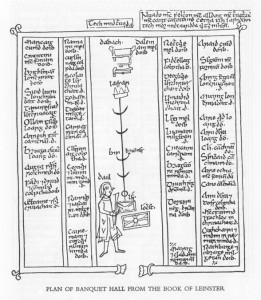 “O Cormac, grandson of Conn,” said Cairbre, “what are the dues of a chief and of an ale-house?”
“O Cormac, grandson of Conn,” said Cairbre, “what are the dues of a chief and of an ale-house?”
“Not hard to tell,” said Cormac.
“Good behaviour around a good chief
Lights to lamps
Exerting oneself for the company
A proper settlement of seats
Liberality of dispensers
A nimble hand at distributing
Attentive service
Music in moderation
Short story-telling
A joyous countenance
Welcome to guests
Silence during recitals
Harmonious choruses.”

“O Cormac, grandson of Conn,” said Cairbre, “What were your habits when you were a lad?”
“Not hard to tell,” said Cormac.
“I was a listener in woods
I was a gazer at stars
I was blind where secrets were concerned
I was silent in a wilderness
I was talkative among many
I was mild in the mead-hall
I was stern in battle
I was gentle towards allies
I was a physician of the sick
I was weak towards the feeble
I was strong towards the powerful
I was not close lest I should be burdensome
I was not arrogant though I was wise
I was not given to promising though I was strong
I was not venturesome though I was swift
I did not deride the old though I was young
I was not boastful though I was a good fighter
I would not speak about any one in his absence
I would not reproach, but I would praise
I would not ask, but I would give
For it is through these habits that the young become old and kingly warriors.”

“O Cormac, grandson of Conn,” said Cairbre, “What is the worst thing you have seen?”
“Not hard to tell,” said Cormac. “Faces of foes in the rout of battle”.
“O Cormac, grandson of Conn,” said Cairbre, “What is the sweetest thing you have heard?”
“Not hard to tell,” said Cormac. “The shout of triumph after victory; Praise after wages; A lady’s invitation to her pillow.”

“O Cormac, grandson of Conn,” said Cairbre, “What is worst for the body of man?”
“Not hard to tell,” said Cormac.
“Sitting too long; lying too long;
exerting oneself beyond one’s strength; running too much; leaping too much; frequent falls;
sleeping with one’s leg over the bed rail;
gazing at glowing embers, wax, bestings, new ale, bull-flesh, curdles, dry food, bog-water;
rising too early; cold; sun; hunger;
drinking too much; eating too much; sleeping too much; sinning too much; grief; running up to a height; shouting against the wind; drying oneself by a fire;
summer-dew; winter-dew;
beating ashes;
swimming on a full stomach; sleeping on one’s back;
foolish romping.”

“O Cormac, grandson of Conn,” said Cairbre, “What is the worst pleading and arguing?”
“Not hard to tell,” said Cormac.
“Contending against knowledge
contending without proofs
taking refuge in bad language
a stiff delivery
a muttering speech
hair-splitting
uncertain proofs
despising books
turning against custom
shifting one’s pleading
inciting the mob
blowing one’s own trumpet
shouting at the top of one’s voice.”

“O Cormac, grandson of Conn,” said Cairbre, “Who are the worst for whom you have a comparison?”
“Not hard to tell,” said Cormac.
“A man with the impudence of a satirist
with the pugnacity of a slave-woman
with the carelessness of a dog
with the conscience of a hound
with a robber’s hand
with a bull’s strength
with the dignity of a judge
with keen ingenious wisdom
with the speech of a stately man
with the memory of an historian
with the behavior of an abbot
with the swearing of a horse-thief
and he wise, lying, grey-haired, violent, swearing, garrulous; when he says ‘the matter is settled, I swear, you shall swear’.”

“O Cormac, grandson of Conn,” said Cairbre, “I desire to know how I shall behave among the wise and the foolish, among friends and strangers, among the old and the young, among the innocent and the wicked.”
“Not hard to tell,” said Cormac.
“Be not too wise, be not too foolish
be not too conceited, nor too diffident
be not too haughty, nor too humble
be not too talkative, nor too silent
be not too hard, nor too feeble
If you be too wise, one will expect too much of you
If you be foolish, you will be deceived
If you be too conceited, you will be thought vexatious
If you be too humble, you will be without honour
If you be too talkative, you will not be heeded
If you be too silent, you will not be regarded
If you be too hard, you will be broken
If you be too feeble, you will be crushed.”
Translated by Kuno Meyer, “The Instructions of King Cormac mac Airt”, Todd Lecture Series vol. XV, Royal Irish Academy, Dublin 1909

1 thought on “The Instructions of King Cormac”